
Programma
- Abbas Kiarostami: The Chorus – kortfilm (1982)
- Golnaz Shariatzadeh: Bluer Womb voor ensemble, electronics en animatie (WP)
- Alexander Khubeev: Don't leave the room & Silentium! voor solo performer, ensemble, electronics en live video (WP)
Productie: Gaudeamus Utrecht, DE SINGEL, Musica Strasbourg, Muziekcentrum De Bijloke Ghent, Nadar Ensemble, Ultima Oslo Contemporary Music Festival
Opdracht Bluer Womb en Silentium!: Nadar Ensemble met steun van de Ernst von Siemens Music Foundation. Opdracht Silentium!: Ultima Oslo Contemporary Music Festival en Gaudeamus Festival - ULYSSES Platform, gefinancierd door de Europese Unie
Programmatoelichting
In 1969 schreef de Russische dichter Joseph Brodsky (1940-96) een gedicht dat bekend zou worden onder de openingsregel Don’t leave the room. In zes kwatrijnen drukt hij de lezer op het hart vooral binnen te blijven. Waarom zou een mens immers de deur uitgaan, als je vier muren, een bed en voldoende sigaretten tot je beschikking hebt?
Over de betekenis van Brodsky’s woorden zijn de meningen verdeeld. Is het een ode aan vrijwillige afzondering, een advies tot zelfcensuur, een ironische waarschuwing aan vrienden om uit de buurt van de KGB te blijven? Of schuilt er juist een verborgen oproep in om de stilte te doorbreken en in verzet te komen tegen onderdrukking?
In dit interdisciplinaire concert komen al die betekenissen samen, en worden nieuwe, actuele lagen toegevoegd. Zo verkent Alexander Khubeev in Don’t Leave the Room en Silentium!:de psychologische en politieke mechanismen van censuur en zelfcensuur, met gebarentaal als oorverdovend stille metafoor. Golnaz Shariatzadeh creëert in Bluer Wombe en imaginaire ruimte waarin herinnering en rouw over de Iraanse opstand van 2022 samenvloeien met hernieuwde hoop voor de toekomst —een even persoonlijke als universele zoektocht naar beschutting in tijden van politieke repressie.
Muzikale 'doublethink'
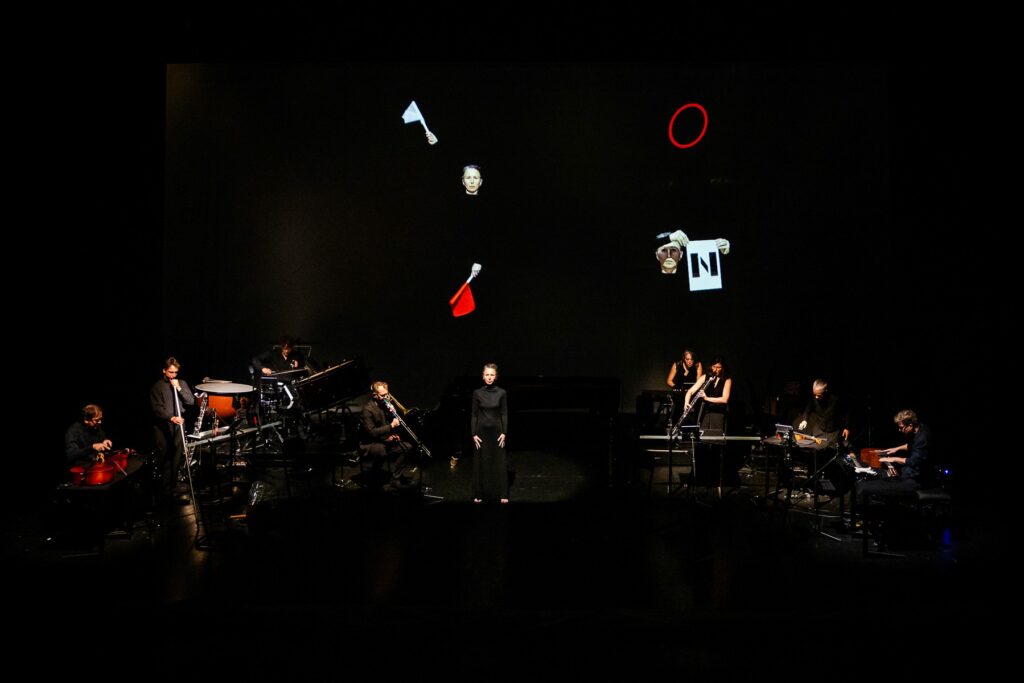
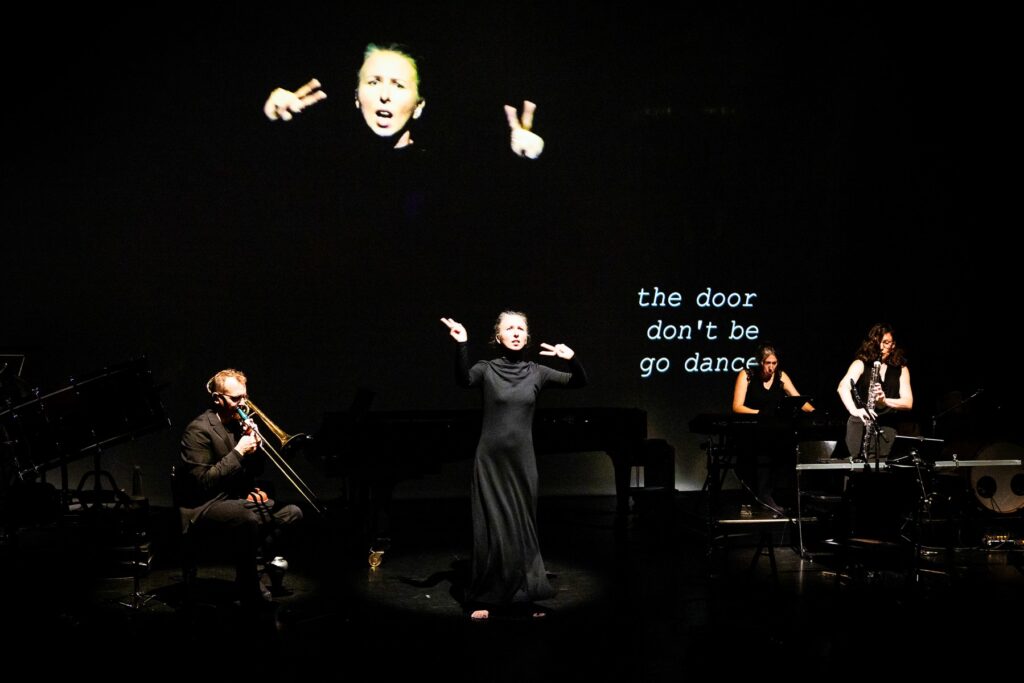
We schrijven begin 2020 als componist Alexander Khubeev bericht krijgt van de Aksenov Foundation, een fonds ter ondersteuning van hedendaagse kunst. Of hij een stuk wil schrijven voor hun project Russian Music 2.0. Hij mag maken wat hij wil. Carte blanche, zoals dat heet.
Khubeev (°1986) heeft nog wel een plannetje liggen. Al tijden loopt hij rond met het idee om een stuk rond gebarentaal te maken. ‘Ik ben altijd al geïnteresseerd geweest in de relatie tussen muziek en gestiek’, klinkt zijn stem begin juni over de videoverbinding. ‘Naarmate ik mij meer ging verdiepen in gebarentaal, ontdekte ik dat het semantisch zeer genuanceerd in elkaar zit en dat je er prima een tekst mee zou kunnen vertolken. Een beetje zoals je in vocale muziekeen gedicht zou zetten, maar dan met handbewegingen in plaats van een stem.’
Khubeev neemt de proef op de som in Don’t Leave the Room, waarin een solist (zowel live als virtueel op het podium te zien) Brodsky’s gelijknamige gedicht vertolkt in verschillende soorten gebarentaal -Russische doventaal, gebaren van speciale legereenheden en het semafooralfabet. Gedurende het stuk ontstaan steeds nieuwe interacties tussen de hand-en armgebaren van de solist en het zevenkoppige ensemble dat grossiert in onorthodoxe speeltechnieken. Zo spelen de blazers op metalen buizen en ontlokken de strijkers met geribbelde deurstoppers onvermoede klanken aan hun snaren.
Khubeev herinnert zich hoe zijn stuk nog tijdens het componeren werd ingehaald door de realiteit. Door het uitbreken van de coronapandemie zit plotseling de hele wereld noodgedwongen binnen. Toch raakt de thematiek van Don’t Leave the Roomvoor Khubeev aan meer dan alleen de pandemische context, zegt hij: ‘In wezen gaat het stuk over censuur. Niet alleen de onderdrukking van bovenaf, door een autoritair regime, maar ook de censuur die mensen zichzelf opleggen uit angst voor repercussies. Die zelfcensuur, en het isolement dat eruit voortvloeit, vormt de eigenlijke thematiek van dit stuk.’
Het gebruik van gebarentaal diende daarbij niet als doel maar als metaforisch middel: het onderstreept de oorverdovende stilte van iemand die wel iets te zeggen heeft, maar de woorden niet durft uit te spreken. De parallel met de politieke realiteit in het huidige Rusland (‘in 2020 al voelbaar’, aldus Khubeev) laat zich raden.
In de slotmaten van Don’t Leave the Room ontvouwt zich een opmerkelijke scène als de geprojecteerde beelden van de solist zich plotseling verdubbelen. Binnen no time is zij verwikkeld in een druk gesticulerend gesprek met drie dubbelgangers. Gevraagd naar de betekenis van dit moment, zegt Khubeev: ‘In zekere zin symboliseert dit beeld de psychologische consequenties van censuur. Dat wat voor het oog van de buitenwereld moet worden doodgezwegen, gaat in iemands binnenwereld alsnog een eigen leven leiden. Je zegt het één, maar vindt ondertussen iets heel anders.
Het is die notie van wat Khubeev in navolging van George Orwell’s dystopische roman 1984‘doublethink’ noemt, die het vertrekpunt vormt voor zijnnieuwe compositie Silentium!:, naar het gelijknamige gedicht van Fjodor Tjoettsjev (1803-73), waarin de dichter de lezer tot stilte maant: waarachtige emoties en gedachten houdt men immers beter voor zichzelf.
Op het eerste gezicht liggen parallellen tussen Brodsky en Tjoettsjev voor het oprapen, maar volgens Khubeev is er een subtiel verschil: ‘Brodsky’s gedicht is geschreven met veel ironie. Ja, hij schrijft over het niet verlaten van de kamer, maar in feite daagt hij uit tot verzet. Tjoettsjev is anders. Hij vraagt je om te zwijgen; het is een advies om te overleven in een situatie waarin je niet kunt zeggen wat je denkt.’ Doublethink avant la lettre. Doublethink, avant la lettre.
Deze dubbele bodem werkt door in de opzet van Silentium!:, een stuk dat volgens Khubeev ‘polyfoner’ isdan Don’t Leave the Room. Waar de live solist en haar projecties eerst in elkaars verlengde lagen, daar vormen zij nu vaker een nadrukkelijk contrapunt. Ook muzikaal zet hij verdere stappen. De klankmogelijkheden van het ensemble worden nog verder uitgebreid met elektronica, nieuwe speeltechnieken en eigen ontwikkelde instrumenten. Persoonlijke favoriet: een drie meter lange staaldraad met een frisdrankfles als resonator, zowel te beplukken als te bestrijken.
Persoonlijke favoriet: een drie meter lange staaldraad met een frisdrankfles als resonator, zowel te beplukken als te bestrijken.
Spervuur aan clusters
Zouden Joseph Brodsky en Galina Oestvolskaja (1919-2006) elkaar ooit hebben ontmoet? In theorie had het gekund, want beiden leefden in Sint-Petersburg -of Leningrad, zoals de stad destijds heette —totdat Brodsky in 1972, na aanhoudende vervolging door de Sovjet-autoriteiten, naar Amerika vluchtte
De praktijk is echter weerbarstiger; zoals dirigent Reinbert de Leeuw ondervond tijdens de opnames van de documentaire-serieToonmeesters, zette Oestvolskaja zelden een voet buiten haar krap bemeten appartement. Daar, in zelfgekozenafzondering, werkte ze aan een even compromisloos als onvergelijkbaar oeuvre. Voor de bureaulade, zoals dat heet, omdat haar muziek (kernwoorden: weerbarstig, ongenaakbaar) nooit door de Sovjet-censuur zouden komen. Neem de Zesde pianosonate uit 1988, waarin de pianist met vlakke hand en onderarm een spervuur aan fortississimo-clusters uit de toetsen beukt. Tegen het einde stijgt er, als uit het niets, een handvol mysterieuze fluisterakkoorden op —een moment van verstilling in een verder meedogenloze klankwereld.
Toevluchtsoord van de verbeelding
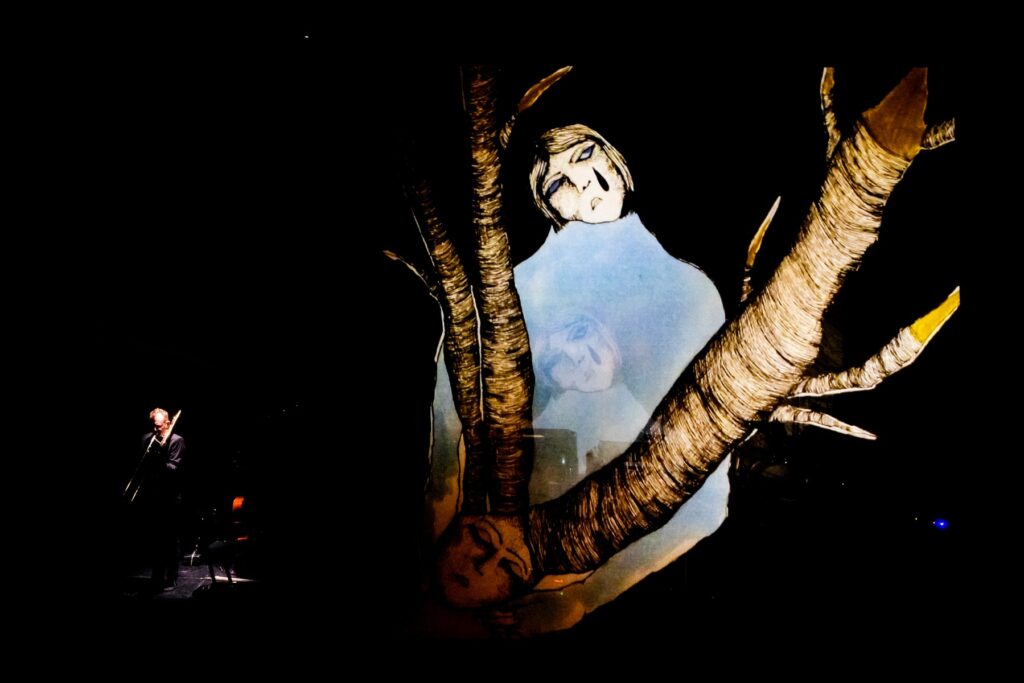
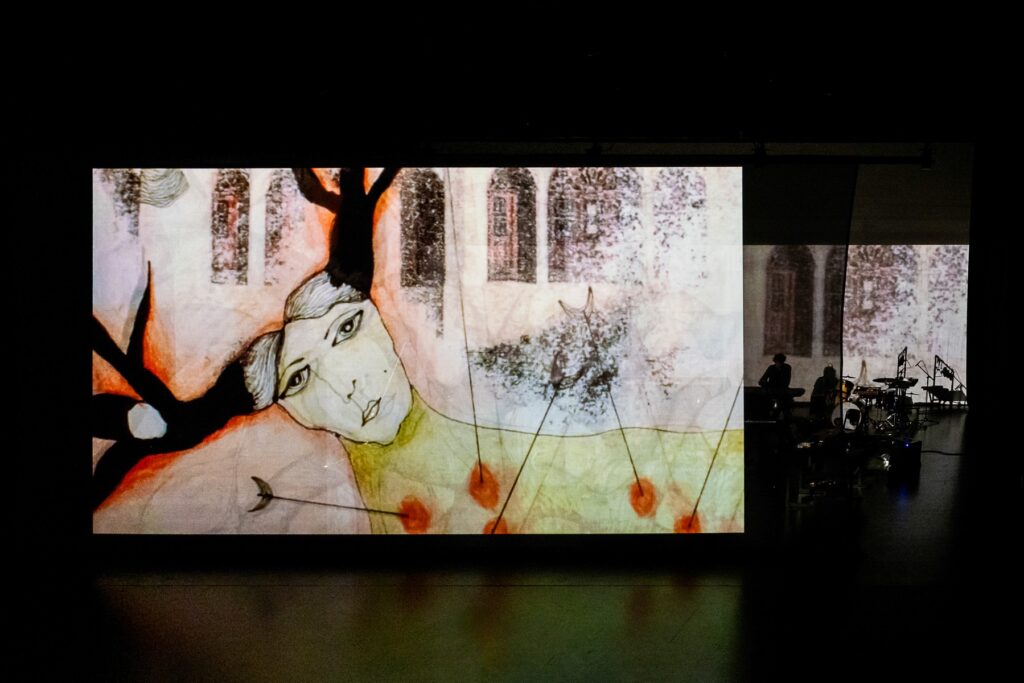
De Iraanse componist en beeldend kunstenaar Golnaz Shariatzadeh (°1996) was zeventien toen ze naar de Verenigde Staten vertrok om haar droom waar te maken: concertviolist worden. Het liep anders. Tijdens haar studie aan Brooklyn College ontdekte ze dat haar hart eigenlijk meer bij het componeren lag. Aldus geschiedde. Momenteel werkt ze aan Harvard University aan haar PhD in compositie, waar ze studeert bij Chaya Czernowin.Noem het eengeval van bloed dat kruipt waar het niet gaan kan. Reeds als kind bedacht Shariatzadeh verhalen die ze uitwerkte in tekeningen: fantasiewerelden, mysterieuze steden en gebouwen, vol geheime vertrekken. Het was, naar eigen zeggen, een manier om te overleven onder het juk van een totalitair regime. ‘Opgroeien in Iran betekende dat er nooit een grens bestond tussen het persoonlijke en het politieke. Om te ontsnappen, creëerde ik mijn eigen ruimtes. Plekken om mijzelf in terug te trekken.’De verbeelding als veilige ruimte, als toevluchtsoord —die notie loopt nog altijd als een rode draad door Shariatzadehs werk. Daarin verbindt zij een intieme, maar geladen klankwereld, die zich beweegt op het grensgebied tussen akoestisch instrumentarium en elektronica, metpoëtische en indringende stop-motionanimaties.
Neem haar stuk Mom, een audiovisueel lamento over het verlangen naar hereniging met haar familie en moeder. Echo’s uit het laatste deel van Beethovens 31e pianosonate, opus 110, zweven door verlaten klankvelden van zachte clusterakkoorden, veeg-en blaasgeluiden. In de verte tinkelen belletjes. We zien beelden van een foetus in rood schemerlicht. Kronkelende navelstrengen verbinden een kinderlijf met een beschermend moederlichaam. Uitsneden van Leonardo da Vinci’s Madonna Litta: Maria die de kleine Christus de borst geeft
Shariatzadehs artistieke uitgangspunten zijn intens persoonlijk, en toch overstijgt haar werk de sfeer van het particuliere. Je zou kunnen zeggen dat haar verbeeldingsruimten tevens sublimatie-ruimten zijn, waarin persoonlijke ervaringen tot universeler gevoelde affecten worden (iets anders dan emotie). Zelf spreekt zij over haar stukken als becomings: ‘Ik hoop dat mijn werk een ruimte biedt waar pijn en verdriet kunnen transformeren in kracht, in hoop, in schoonheid.’
Zie ook Fabric of Sorrow (2023), opgedragen aan de slachtoffers van de protesten die een jaar eerder in Iran uitbraken na de dood van Mahsa Amini. Zelf omschrijft Shariatzadeh dit werk voor animaties en ensemble als ‘Een imaginaire architectuur die bestaat uit herinneringen aan de opstand. Een gebouw dat is opgetrokken uit het vlees en bloed van de vrouwen die hun leven gaven. In het hart van dat bouwwerk weven rouwende moeders een lichtgevende stof uit het haar van hun dochters.’
Haar nieuwe werk Bluer Womb(beschermende ruimte bij uitstek), is volgens Shariatzadeh verwant aan Fabric of Sorrow. Ook hierin resoneren echo’s van de Iraanse opstand. Onheilspellende gong-en klokklanken. Een bijtend cluster op de elektrische gitaar, in de partituur omschreven als ‘a distant scream’. De animatiebeelden, geprojecteerd op een transparant doek dat voor de musici hangt, tonen onder meer scènes uit het lange epische gedicht Shahnameh, het Perzische Boek der Koningen. Meer specifiek het verhaal van de mythische held Rostam, die de kwaadaardige demon Div-e Sepid verslaat. Noem het een mythologische metafoor voor de strijd tegen het huidige regime.
En toch, waar Fabric of Sorrowdirect wortelde in de opstand, daar is Bluer Wombeerder een terugblik, een reflectie op het gevoel van leegte en verlies dat volgde. ‘Er zijn zoveel offers gebracht,’ zegt Shariatzadeh, ‘maar de gehoopte revolutie is uitgebleven. Die verloren hoop, daar gaat dit stuk over.’
Daarnaast klinkt inBluer Wombeen persoonlijke laag mee: het gemis van een waardevolle zus die lange tijd als een moederfiguur voor haar was. En dus zien we in de animatie twee zussen door een vervallen stad dwalen, zoekend naar beschutting in elkaars nabijheid. In de schoot van één van hen bloeien bloemen op —herinneringen en toekomstsdromen over de prachtige plek die hun stad ooit was en weer zou kunnen worden.
Over hoopvolle toevluchtsoorden gesproken.
Pleidooi voor verbinding
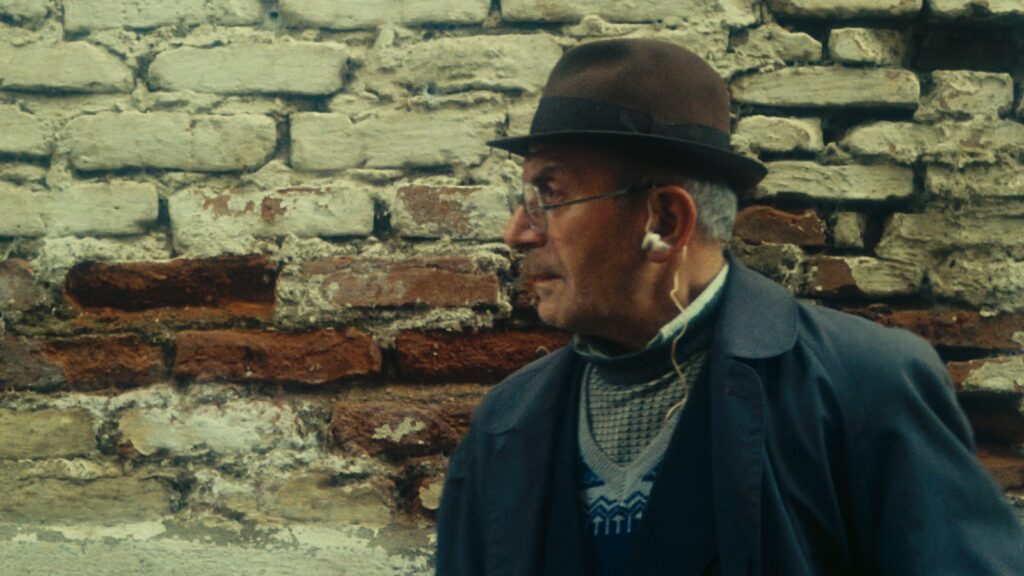
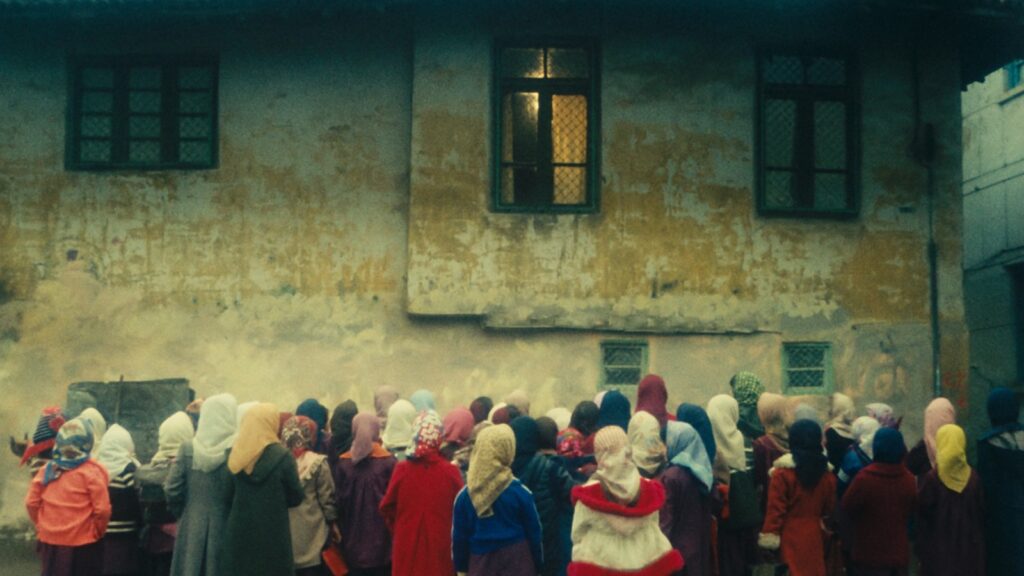
In zijn korte film The Chorus(1982)van de Iraanse cineast Abbas Kiarostami (1940-2016) kan een oude man het lawaai van de stad niet langer verdragen. Hij zet zijn gehoorapparaat uit en sluit zich af van de wereld —maar hoort daardoor ook zijn aanbellende kleindochter niet meer. Buiten roept een koor van schoolmeisjes hem vergeefs tot de orde. Met subtiele eenvoud schetst Kiarostami een fabel over stilte en geluid, ouderdom en jeugd, isolement en verbondenheid. Een poëtisch pleidooi om je niet van de wereld af te wenden, maar te blijven luisteren naar stemmen die gehoord moeten worden.
Nadar Ensemble
Marieke Berendsen, violin // Nico Couck, e-guitar // Elena Evstratova, solo performer // Katrien Gaelens, flute // Yves Goemaere, percussion // Wannes Gonnissen, sound // Robin Goossens, business director // Pieter Matthynssens, cello, artistic director // Elisa Medinilla, piano // Thomas Moore, trombone // Stefan Prins, artistic director // Steven Reymer, video and light // Dries Tack, clarinet // Floor Vandevelde VGT // Veerle Vervoort, production manager // Video Editor Don’t Leave The Room and Silentium! (post-production & editorial input): Sasha Golikova
Joseph Brodsky
Translation by Alexandra Berlina
Don’t leave the room. This is better left undone.
You’ve got cheap smokes, so why should you need the sun?
Nothing makes sense outside, happiness least of all.
You may go to the loo but avoid the hall.
Don’t leave the room. Don’t think of calling a taxi.
Space consists of the hall and ends at the door; its axis
bends when the meter’s on. If your tootsie comes in – before
she starts blabbing undressing – throw her out of the door.
Don’t leave the room. Pretend a cold in the head.
What could be more exciting than wallpaper, chair and bed?
Why leave a room to which you will come back later,
unchanged at best, more probably mutilated?
Don’t leave the room. There might be a jazzy number
on the radio. Nude but for shoes and coat, dance a samba.
Cabbage smell in the hall fills every nook and cranny.
You wrote so many words; one more would be one too many.
Don’t ever leave the room. Let nobody but the room
know what you look like. Incognito ergo sum,
as substance informed its form when it felt despair.
Don’t leave the room! You know, it’s not France out there.
Don’t be an imbecile! Be what the others couldn’t be.
Don’t leave the room! Let furniture keep you company,
vanish, merge with the wall, barricade your iris
from the chronos, the eros, the cosmos, the virus.
Fyodor Ivanovich Tyutchev
Silentium!
translated by Vladimir Nabokov
Speak not, lie hidden, and conceal
the way you dream, the things you feel.
Deep in your spirit let them rise
akin to stars in crystal skies
that set before the night is blurred:
delight in them and speak no word.
How can a heart expression find?
How should another know your mind?
Will he discern what quickens you?
A thought once uttered is untrue.
Dimmed is the fountainhead when stirred:
drink at the source and speak no word.
Live in your inner self alone
within your soul a world has grown,
the magic of veiled thoughts that might
be blinded by the outer light,
drowned in the noise of day, unheard…
take in their song and speak no word.
“I want to say something, but I’m not allowed to”
Kevin Voets in conversation with Elena Evstratova, solo performer with Nadar Ensemble
The Theaterstudio at DE SINGEL was alive with artistic energy. A rehearsal had just been cut short: musicians tuned their instruments, a technician checked the cables, the projector flashed brief fragments of images onto the wall. In the middle of this restless scene, Helena Evstratova came over to join us at the table. She had spent the previous hours in the eye of the storm—as the solo performer in Don’t Leave the Room en Silentium!, two new works by Russian composer Alexander Khubeev—and then took a moment to sit down for a lively conversation, mediated by sign language interpreter Nine Van Belle.
Elena Evstratova (born 1976) was born in Siberia, studied in Moscow, and worked for almost twenty years as an actress in youth and regular theater. She specialized in mimicry, dance, and comedy, taught deaf children, and toured internationally. Since 2018, she has been living in Belgium, where she has collaborated with Silence Radio and Dahlia Pessemiers-Benamar, among others. At Nadar Ensemble, known for its musical experiments, she now faces an unprecedented challenge: translating Russian poetry into gestures, in dialogue with a contemporary music ensemble.
“Don’t leave the room. This is better left undone.”
This is Evstratova’s first collaboration with a music ensemble. “I am an actress, a dancer. I was familiar with rhythm, but music—that’s something else entirely. I can’t read music, and when I got the score, I didn’t understand a thing.”
Composer Alexander Khubeev developed a digital visual aid: bars that appear on a screen and show the duration of the notes. “That way I can see when something is short or long,” she says. “But still: it’s chaotic. Everything has to coincide exactly with the music, and I feel an enormous responsibility. I am the central performer—everyone is watching me. One mistake and the whole piece falls apart.”
Evstratova loves improvisation, but in this production that is impossible. “Everything is fixed. The musicians play strict scores. If I change anything, it no longer fits. It’s precision work: when the trombone plays a long note, I adjust my movement accordingly. My gestures must follow the music exactly.”
Don’t Leave your Room is based on Joseph Brodsky’s untitled poem from 1969, written during the Hong Kong Flu. It calls for isolation: ironic, melancholic, sometimes threatening. For Evstratova, it evokes memories of her childhood in the Soviet Union.
“I grew up with my mother in a tiny apartment; each family had only one room. The kitchen was communal, as was the hallway. I remember that when you had to go to the toilet, you had to do it as quickly as possible because there was always someone waiting behind you. You also had to be as quiet as possible in your room—the walls had ears. You were literally locked up between four walls. To me, Brodsky’s text feels like a prison—but also like protection. It says: stay inside, be silent, don’t speak. That’s censorship, but it’s also survival.”
At the end of Khubeev’s composition, her image is multiplied on the screen. The audience sees her talking to multiple versions of herself. “I don’t see those projections myself while playing,” she says, “but I understand the idea. They are pieces of myself that come out: my heart, my thoughts, my emotions. As if, after all, the inner voices that I am not allowed to express become visible.”
The last word of Brodsky’s poem is “virus.” “A virus is not just a disease. Negative thoughts also spread like a virus. That word can be interpreted in many ways. During Corona, everyone was locked up in rooms—just as Brodsky describes. I can relate to that. But it goes further: a virus can also be an idea that you can no longer stop.”
Silentium!
The second work, Silentium!, is based on Fyodor Tyutchev’s poem from 1868. It advises the reader to keep feelings and thoughts hidden, because once spoken, they lose their purity.
For Evstratova, this is recognizable. “When I read the poem, I feel that I want to say something but cannot – or am not allowed to. I can’t get it out. That is my experience as a deaf performer: there is always a gap between what I read, what I feel, and what I can express. The taboo, the censorship – that is in the language itself. That is why this poem touched me so deeply.”
Unlike Don’t Leave Your Room, Silentium! was created in close collaboration with her. “I first made a translation into Russian sign language myself. Not literally—that’s impossible. You have to choose emotions and images. I gave that version to Sasha [Khubeev] and he made music to go with it. Sometimes my gestures even inspired him to come up with musical ideas. My gesture for ‘feeling’ [pointing your index finger in your hand or towards your heart] reminded him of Morse code, like a heartbeat. That’s how the music and my gestures really came together. That’s why Silentium! feels a bit like my own child.”
How does a deaf performer experience poetry, in which sound and rhythm are so important? Does she have an “inner ear”? “No,” says Evstratova. “I don’t hear sounds, not even internally. But words do give me a feeling. I translate that feeling into gestures. The emotions are in my hands, in my body. For hearing people, poetry sounds; for me, it appears.”
But there is always a loss. “You can’t literally translate a poem into sign language. The rhythm and sound disappear. That feels like a form of censorship: there is always something I can’t say. But that’s exactly where the power lies. In that void, the emotion comes to the surface.”
Which of the two pieces is closest to her heart? “Silentium!,” she says without hesitation. “Because I was involved from the beginning. I was able to contribute my interpretation, and Alexander turned it into music. It’s my own work. Don’t Leave the Room was more difficult because I had to adapt to something that already existed.”
“Come and see with an open mind. Don’t expect to understand everything – neither the gestures, nor the music. It’s about the emotion that comes across. For hearing people, it may be strange to see gestures without sound. For deaf people, it’s strange to see music they can’t hear. But together it forms a new whole. I hope everyone feels what I’m trying to show.”
In Don’t Leave the Room en Silentium!, Elena Evstratova embodies not only two poems, but also a tradition of Russian poetry in a context of political oppression. Her body becomes an instrument that is silent and speaks at the same time. Where Brodsky ironically calls for seclusion, and Tyutchev seriously urges silence, she makes their words visible in a sign language that the audience cannot understand literally – but can feel all the more strongly.
The tension between incomprehension and emotion lies at the heart of this music theater project. Evstratova concludes: “There is always something I want to say, but I cannot—or am not allowed to. That is precisely where my art begins.”
Kevin Voets on behalf of DE SINGEL. Voets is head of research at the Royal Conservatoire of Antwerp and a lover of new music.
Elena Evstratova
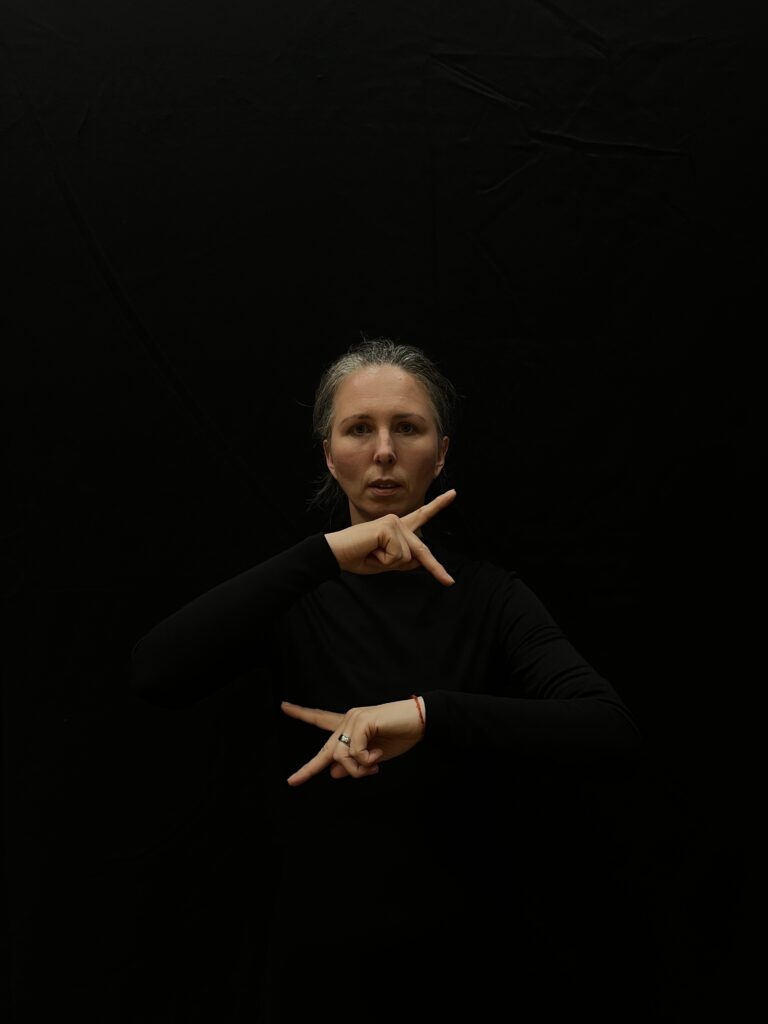
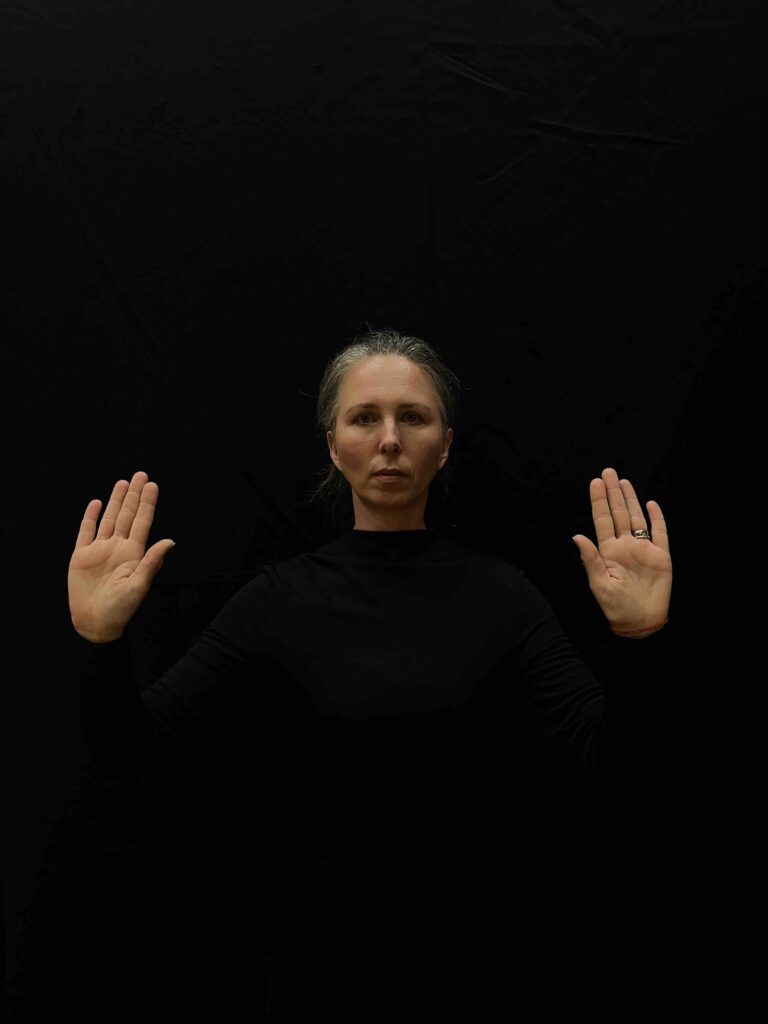
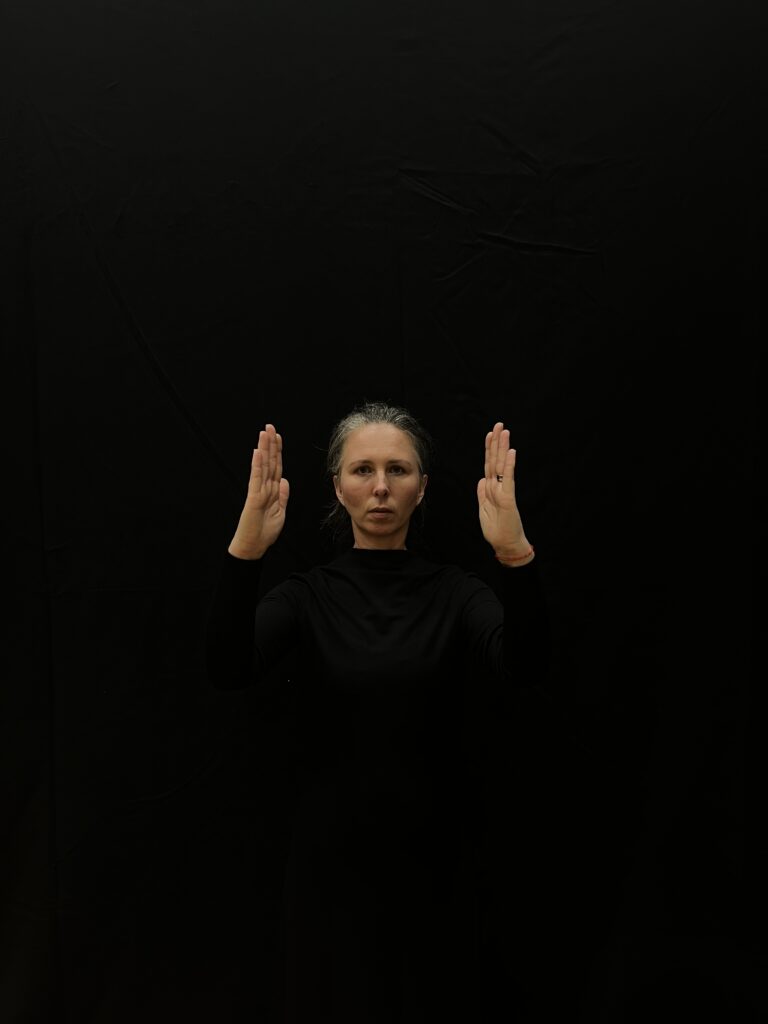
ElenaEvstratova(°1976) is een dove actrice opgegroeid en geboren in Siberie. Sinds 2018 woont ze in Lochristi (Gent). Zij behaalde haar diploma master of arts aan het conservatorium van Moskou. Ook haalde ze haar diploma in de Algemene Kunsten met als hoofdvakken literatuur, kostuum en theatergeschiedenis van Rusland en Europa. Van 2000 tot 2018 werkte ze als professionele actrice in zowel het jeugdtheater als in het reguliere theater. Verder specialiseerde ze zich als dove actrice in het theater van de gezichtsuitdrukkingen en gebaren, dans en comedy. Ook gaf ze jaren theaterlessen aan dove kinderen. Tijdens haar professionele acteerperiode in Rusland was ze vaak in het buitenland te zien. Ze toerde door Duitsland, Praag, Japan, USA, Turkije, Mongolië, Oekraïne en doorheen Rusland.In België ging ze aan de slag met het theatergezelschap Silence Radio onder de artistieke leiding van Dahlia Pessemiers-Benamar. Zij creëerden samen de voorstelling Portici (met o.a. Eurudike De Beul) en verschillende dansperformances
